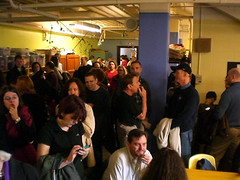As a followup to last night’s special election to fill Dan Liljenquist’s term as State Senator, I noticed some interesting things based on my interactions with other delegates and my review of the actual results (round-by-round, not just the final tally).
First let me provide some metrics that some people might be interested in – we had 264 delegates eligible to vote in this election. Of those, 258 showed up and received credentials but only 257 cast ballots.
At the meeting there was discussion about the practice in IRV voting of still only choosing one candidate – more generally that can be applied to choosing anything less than all the candidates. We can’t really know for sure how many people put less than all 8 candidates on their ballots but in the last round 7 ballots were discarded because they did not include either of the remaining candidates – Todd Weiler and Randy Shumway. This means that the election was finally counted with 250 out of 264 possible votes.
Now on to the issue of perceived electability.
I had the sense before the voting that this would come down to a two-way contest between Todd Weiler and Randy Shumway. That was based on what I had observed of the campaigns and what I had seen and heard from various delegates. The interesting side note to that was how many people I heard speaking favorably about Tim Hawkes but wondering whether he could win.
When the results were announced my instinct that it was a two-man race was confirmed as evidenced by who the last two candidates were. When I saw the full results from all seven rounds I discovered that my impression of Tim’s widespread appeal showed up strongly in the voting. From the very first round it was actually a three-man race. Todd had the lead in every round (in fact, until the final round Randy did not receive more votes than Todd received in the first round) but the top three were always Todd, Randy, and Tim in that order. Tim had 58 votes and the fourth place candidate had 16 votes. All the candidates below Tim combined for 43 votes in the first round. The fact that many of those who liked Tim questioned whether he could get elected bore out in the phenomenon that in the first 6 rounds – until he was eliminated – Tim gained more votes than any other candidate. By the time he was eliminated, Tim was only 4 votes shy of Randy.
Tim and Todd seemed more similar than Tim and Randy as shown by the fact that most of Tim’s votes went to Todd. That leaves me to wonder whether there were 5 of those who supported Todd as their first choice who chose Tim second based on the perception that he could not win. If so and they took that perception out of their calculations Tim would have beaten Randy for second place.
My best guess is that this phenomenon is based on widespread misunderstanding of how IRV voting works. Based on how I have heard people talk about it, it seems that many people think that their vote is counted less if it is not their top vote – they think their vote is wasted if they do not guess correctly who is going to win. They seem to instinctively feel that having a second choice vote hurts their first choice candidate rather than recognizing that their second choice candidate can never receive their support unless their first choice candidate is already eliminated which only happens if their first choice candidate was viewed less favorably than their second choice candidate.
I suspect that the voting patterns would be different if people understood that IRV gives them the opportunity to rank all the candidates rather than being dependent on how all the other voters vote if the person they first voted for is not one of the top two vote-getters. They don’t need to see how others voted in the first round before deciding where to throw their support in the second round.





